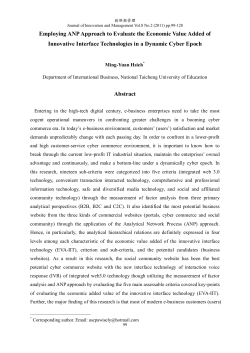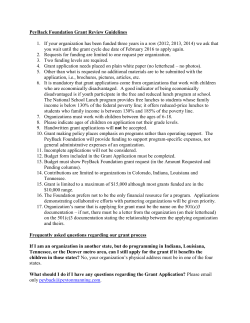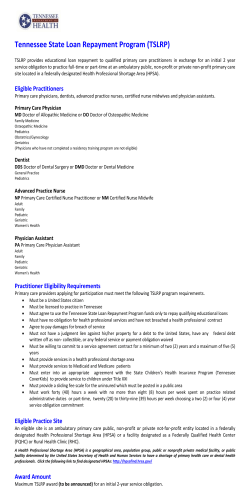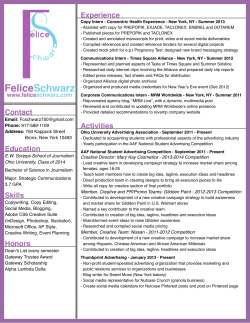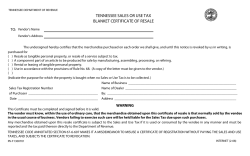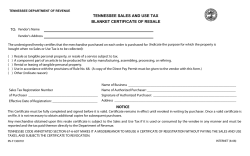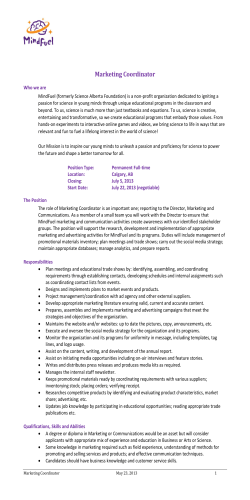
Start-Up Guide For Small e-Businesses
Start-Up Guide For Small e-Businesses Edited by Dr. Richard Rand Associate Professor of Accounting Tennessee Technological University Content Prepared by Sarah Bush Lori Dyer Heather Eberhart Sarah Lynn Farley Stephanie Flatt Leah Gillen Mia Harper Natausha Hill Jacqualene Hite Jennifer Ledbetter Alex Lee Ashley Martin Brad Martin Angela Mason John Reel Dan Scott Josh Stone Scott Waller Emily Wheeler Wanda Wilder Meredith Wilmore Published in Cooperation with Tennessee Tech University The Putnam County Chamber of Commerce The Small Business Development Center at Tennessee Tech Startup Guide for Small e-Businesses Introduction This Guide was prepared by students at Tennessee Tech University as a tool to assist with the start-up process for small e-businesses. While this booklet is not an allinclusive “How To” tool, we believe that most people will find things inside that will make the process of starting a small e-business less stressful and more likely to succeed. The simple, but sad, reality is that many new businesses never make it past their first year. Often they are underfunded, poorly planned, inadequately marketed, or just plain out-hustled in the marketplace. Sometimes through no fault of the new entrepreneur, circumstances result in the failure a new business endeavor. The other side of the story is where all entrepreneurs want to be. The heart and soul of the American Dream is the self-made entrepreneur. That individual who, through hard work, willpower, and a little good fortune, finds financial independence and pride in successfully shepherding a new business to profitable maturity. The Path to Success for any business is strewn with many risks and perils. Many of those risks can be avoided by careful preparation during the planning process. Other potential problems can be overcome early by anticipating those problems and being properly prepared to meet them when they arise. Through careful preparation, planning, and self-education, most people can realize success. A few pieces of advice before you get into the “meat” of this guide: 1. 2. 3. 4. 5. Be realistic. Your new business may succeed, or it may fail. As long as you put forth your best effort, you are a winner. Success never comes without sacrifice. In all my years of working with small businesses and helping people to start them, I have never found one person who avoided taking a risk. Starting up any new business requires almost single-minded focus for the period of time it takes to get the business goind. Make sure you are adequately funded. The #1 reason for the failure of any new business is inadequate funding on the front end. Be prepared to work hard. (While many people truly love what they do, I have found that my father’s wisdom is usually right. He used to tell me, “If it was supposed to be fun, they wouldn’t have called it work!”) Be a learner and don’t resist change. You must continually be a student of business and your customers. Learn from them. Educate yourself about your business. Jack Welch, former CEO of General Electric, said, “If you are not changing faster than your environment, you are falling behind.” Good luck! And may you realize all your dreams! 2 Startup Guide for Small e-Businesses Business Plan Issues I. Putting your business plan into words • Before actually starting your e-business you need to make sure that you are capable of putting your entire plan into writing. • The following is a outline for an e-business plan: I. Title Page 1. Make it look professional and interesting. 2. Remember, lots of investors may only look at the first page to make their decision, make sure you catch their attention. II. Table of Contents 1. This will help quickly guide readers to exactly what they are looking for. III. Executive Summary – 1 to 3 pages 1. State your purpose and goals. 2. Overview of product and services. 3. Unique skills that would be beneficial to your business. 4. Summarize your marketing strategy. 5. Provide a financial summary. IV. Define the Business 1. Fully describe the product or service you are providing. V. Marketing Plan 1. Define your target market and describe your marketing strategy. VI. Operations 1. Describe exactly what your e-business does, the resources that will be needed, and the key processes involved VII. Management Description 1. Identify principals and include resumes for each. 2. Describe employee benefits and salaries. VIII. Financial Statements & Projections 1. Specify amount of funds required. 2. If available, include financial statements from previous years. 3. Develop projected Balance Sheets, Income Statements, and Cash Flow Statements that will forecast your expectations for future years. IX. Concluding Statement X. Appendices (including supporting documents, advertising and product samples, and relevant legal documents) Note- this outline can be lengthened and added to as deemed appropriate for your specific e-business needs, but you should at least have the information specifically stated that you deem applicable. 3 Startup Guide for Small e-Businesses II. Is this business just for extra income or will it need to be your primary source of income? • • • • • III. Tax Issues • • IV. Make estimated tax payments throughout the year to the IRS to avoid tax penalties. These estimates will be based on your expected net income. For a sole proprietorship, this means that the amounts you pay to yourself will be subject to estimated tax payments. In addition, to estimated payments for Federal Income Tax, do not forget to consider Self-Employment Tax (IRS Tax Form SE will be used to compute this amount.) Making your website work for you. • • • • V. Consider how much time you are willing to put into this business if you only want it to be for extra income. Know the demand for your product. Is the demand sufficient to generate the income you need? If the demand for your product increases, are you going to be able to grow to support that demand, are you willing to put in the time necessary to do so? Know what your expected net profit margins are going to be at different product demand levels. What are the seasonal sales patterns? If most of your business is in the summer, for example, how will you pay the bills during the winter? Would you like to earn income from your e-business from other than just selling your products? Are you going to be willing to place advertisements on your web site for other companies? How much space will you allocate for this purpose? How much should you charge for advertising on your website? Competition • Define your competition. Find out who you are competing against on the internet and in your physical area. Remember, as an e-business, you are competing with businesses all over the world. • Know the competition’s price structure. a. Are your competitors selling a product for a lower price? b. Can you afford to sell at a comparatively low price and still maintain an adequate profit margin? c. Is there something about your “version” of the product or service that might justify a higher price to your customers? 4 Startup Guide for Small e-Businesses VI. • Make your product unique within the market. a. The product must be marketed in such a way that the consumer believes they can’t possibly find the same quality, service, or professionalism anywhere else. b. It is important to add value to your product and to differentiate yourself from the rest of the market. This can be done in a number of ways, such as free shipping, offering a money back guarantee based on satisfaction, or giving the customer something extra that they do not expect. • Define your competitive advantages/disadvantages? a. Do you provide a variety of product or service options? b. Are you an expert in your service field? What are your credentials? c. Are you selling a product that is not generally available in brick-andmortar stores? d. How quickly can you deliver the product? e. Is your website designed to keep people on it as long as possible? Online existence vs. Brick-and-Mortar Location • • • • • Most customers are uncomfortable buying from an e-business that does not have a physical location that can be found using internet mapping services such as Mapquest.com. Will you operate a brick-and-mortar store in addition to the e-store online? Will you maintain office space? Where will you keep your inventory? Are you going to establish a call center? Setting Up Your E-Business I. Website Hosting Services • • • Unless you want to own and manage your own server, you will need to contract with a web hosting service that will maintain your website on their servers. Web hosting services abound on the internet. Look for: Sufficient storage capacity. Multiple email accounts. Free domain name registration. Website statistics. Other questions to ask: How long have they been in business? How do they handle security of their site? What kind of support do they offer? How much can you control the site? 5 Startup Guide for Small e-Businesses II. Website Building Services • • • • • • III. Some people choose to have someone they know develop their website for them. Then they upload the created website to their contracted web hosting service. Alternatively, many web hosting services also have website development tools that aid you in developing your website. The cost of webhosting services and website building services is often very reasonable Costs range from $6.95 per month to $300 per month Considerations for your website: Keep it simple o Stick to basic colors. o Make the font and text easy to read. Download time should be 3 to 8 seconds. Make sure your company name, logo, tag line, and privacy statement are well displayed. Contact information should be easy to find. The site should be easy to navigate. o A user should be able to locate what they are looking for in fewer than 4 clicks. Features to look for include: An online catalog An online shopping cart (such as Paypal) Secure payment transaction processing (SSL) Website development tools Examples of web hosting and website building companies include: www.qcommerce.com www.bizhosting.com www.ipowerweb.com www.ipage.com www.ebay.com smallbusiness.yahoo.com Privacy Policy • • • • • If you are collecting any customer data (names, addresses, email addresses, credit card numbers, etc.) you will need to develop a Privacy Policy for your ebusiness. You should display a link to your Privacy Policy on your website. Consult your business attorney to ensure you follow guidelines set by law. For help in developing your privacy policy, go to: http://www.privacyaffiliates.com/ To add credibility and trust to your website, you can seek out 3rd party assurance seals from the following assurance programs: Truste (www.truste.org) 6 Startup Guide for Small e-Businesses Better Business Bureau Online (www.bbbonline.com) CPA WebTrust (www.cpawebtrust.org) IV. Shipping • • • As an ebusiness, you will need to develop a plan for delivering products to your customers. Remember to add the cost of shipping to your financial plans. Contact information customer service representatives for various shipping companies: Averitt Express DHL FedEx UPS United States Postal Service (USPS) V. 1-800-AVERITT 1-800-CALL-DHL 1-800-GO-FEDEX 1-800-PICK-UPS Check local listings www.averittexpress.com www.dhl.com www.fedex.com www.ups.com www.usps.com Return Policy • • • • • Decide on your return policy. Sales will be going to customers across the US, and possibly internationally. Select a return policy that adds value to your customer, without being prohibitively expensive. A Full Return Policy can be very useful for items that require approval, such as clothing. However, you will have to make a decision whether to “eat” the return shipping. If you put a time period on your return policy, define carefully when the “clock” starts. Does the time period begin when you ship the goods, or when the customer receives them? Does the time period extend to the date the customer sends the goods back to you, or when you receive them? If you offer “Store Credit”, can your payment module (see above) handle payment options other than credit card payments? Store Credit Gift Certificates Debit Cards Will you charge a restocking fee? 7 Startup Guide for Small e-Businesses VI. Local Advertising VI. Web Advertising Areaconnect N2 the Net MMA Creative Contact Information Areaconnect.com Randy Robbins Mike McCloud 931-372-9129 931-528-8852 Radio Advertising Clear Channel Communications JWC Broadcasting Lehra Heidel Debby Horner 931-526-7144 931-528-6064 Television Advertising WCTE Jo Ward 931-528-2222 Newspaper Advertising Herald Citizen Albert Thompson 931-526-9715 Billboard Advertising ROLAND Dave Roland 931-252-0811 Customer Service • • • • Initial setup of frequently asked questions (FAQs) for new clientele to view. Discussion boards can be used to ask questions and members of the customer service department can respond. All customers will have access to this page, so if they ever need to look up a question, it will be available to them. If any type of technical assistance is needed, phone numbers and email addresses need to be readily available to view. A search tool should also added to your website help the customer find what they are looking for. Legal Considerations I. Why do I need a lawyer? • • • Everyone starting a new business should engage a lawyer. A lawyer provides assistance to small business owners by preparing contracts, looking over proposed leases, ensuring that all licenses necessary are obtained, and promotes compliance with all regulations pertaining to your particular business. Lawyers can also help to file a patent or trademark, put together a software license agreement, and handle terminating or disciplining employees. 8 Startup Guide for Small e-Businesses II. Government Regulation Issues • • • III. Federal Trade Commission Advertising and content directed at children is closely regulated by the FTC. Use of the words “free” and “guarantee” in advertising or on your website have specific guidelines. If you collect any information from users of your site, the FTC requires that you have a privacy policy. The FTC has set standards for selling certain items by mail; this applies to Internet sales, as well. Securities and Exchange Commission For publicly traded companies, the SEC considers a Web site a means of disclosing information to the public about a company in regard to “forward-looking statements” and “material” information. The Sarbanes-Oxley Law will put severe burdens on a company considering doing an IPO. Department of Commerce and Defense Regulates companies that use encryption as though they are exporting technology. Encryption algorithms are considered “munitions” for export purposes. The DoD severely restricts doing business with countries such as North Korea, Syria, Yugoslavia, Iran, and Iraq. The DoD regulates when a company needs an export license. What Are the Specific Laws Aimed at e-Businesses? • • • Children’s Online Privacy Act (COPPA) Websites that collect information from children under the age of 13 are required to comply. COPPA includes regulations such as requiring qualifying web sites to get a parent's permission to collect personal information from children under 13. Digital Millennium Copyright Act (DMCA) DMCA criminalizes production and distribution of digital technology that can circumvent measures taken to protect copyright, not merely infringement of copyright itself, and heightens the penalties for copyright infringement on the Internet. Internet Tax Freedom Act The ITFA imposes a moratorium on the creation of new state and local taxes on Internet access, unless such tax was generally imposed and actually enforced before October 1, 1998 (about ten states had such taxes in place, but not California). The moratorium also applies to multiple or discriminatory taxes on ecommerce. 9 Startup Guide for Small e-Businesses • • IV. Trademarks & Copyrights • • • • V. The IFTA also includes declarations that the Internet should be free of foreign tariffs, trade barriers, and other restrictions, and that no new federal taxes should be imposed during the moratorium. Anticybersquatting Consumer Protection Act (ACPA). The ACPA is intended to give trademark and service mark owners legal remedies against defendants who obtain domain names "in bad faith" that are identical or confusingly similar to a trademark or service mark. CAN-SPAM Anti-Spam Law (CAN-SPAM) The CAN-SPAM Act of 2003 establishes the United States' first national standards for the sending of commercial e-mail and requires the Federal Trade Commission (FTC) to enforce its provisions. CAN-SPAM defines spam as "any electronic mail message the primary purpose of which is the commercial advertisement or promotion of a commercial product or service (including content on an Internet website operated for a commercial purpose)." It exempts "transactional or relationship messages." The bill does permit e-mail marketers to send unsolicited commercial e-mail as long as it contains all of the following: • an opt-out mechanism • a valid subject line and header • a legitimate physical address of the mailer • a label if the content is adult in nature. Domain names may be awarded to trademark holders over others through current law. Having trademark registration in the same name as your domain name would help to ensure that you retain ownership of the name. Your company’s nationally registered trademarks should display a ® and unregistered trademarks should display a ™ or SM. The footer of your Web site should also display a copyright notice for the content on your site. The notice should read “© (date) (copyright owner name) All rights reserved.” You should send a copy of the Web site to the Copyright Office to record ownership of the site’s content. Forms, licenses, and permits • • All Businesses have to get an IRS SS-4 Federal Employer ID and you can apply online for it at www.irs.gov/smallbiz. If you have employees, you will need the following: Application for State Unemployment Tax (SUTA) number Information on Federal Unemployment Tax (FUTA) Tennessee Franchise & Excise Tax Registration 10 Startup Guide for Small e-Businesses • VI. Depending on the type of your E-Business, you may need some or all of the following: City Business License County Business License (Required in Putnam County when you gross $3,500) Fire Department Permit Air and Water Pollution Control Permit Sign Permit County Permits State Licenses Federal Licenses Sales Tax License Health Department Permits User Agreements The user agreement requires each user to agree to be bound by a contract governing his/her use of your site by clicking “I Agree” before being permitted to view the site. • The user agreement allows a company to: Dictate how the site can and cannot be used. Dictate who or who may not use the site. Dictate policies and procedures for using the site. Dictate your company’s waiver of stated legal warranties. State your company’s limit of liability for the site. Dictate jurisdiction for any disputes relating to your site. • VII. E-Business Liabilities • • • • • • Affiliate Disputes Copyright Infringement Domain Name Disputes Trademark Infringement Workers Compensation Contract Breach 11 Startup Guide for Small e-Businesses Accounting Considerations I. Why do I need an Accountant? • • • • II. Can I use my personal checking account or credit card for the business? • • III. You should maintain a separate checking account and credit card for your business. It is important to understand that the IRS generally frowns upon what is generally referred to as “commingling of funds”. Federal Tax Identification Numbers (AKA Employer Identification Number) • • • • IV. To determine whether you are a sole proprietorship, a partnership, a limited liability partnership, and an LLC, or an S or C corporation. To set up a chart of accounts, review the numbers periodically and prepare whatever tax returns are needed for your particular company. To make sure the correct type of taxes are paid and to determine if you have employees or independent contractors. If you have employees, you have to send out a W-2 by Jan. 31st, but if you hire independent contractors then you have to send them a 1099 by Jan. 31st. An Employer Identification number is a nine-digit number assigned specifically for identifying a business to the government. Your EIN This number is required by the government on all of their forms or official business documents. All businesses should obtain an EIN. You can apply for a tax id number by talking to your local Internal Revenue Service office and asking for a Form SS-4. You can also download this form at http://www.sba.gov/starting_business/taxes/ein.html. Taxes (Tennessee) • • Franchise Tax Imposed on the privilege of doing business in Tennessee. Required for entrepreneurs doing business in Tennessee. Excise Tax Imposed on the privilege of doing business in Tennessee. Required for all entrepreneurs doing business in Tennessee. Sole proprietors and partnerships are exempt. 12 Startup Guide for Small e-Businesses • Sales Tax Businesses located in Tennessee who do business in other states are not required to collect Tennessee state sales tax or sales tax for any other state unless they have an office in the state where the purchase is made. Businesses located in Tennessee are required to collect sales tax for the state when purchases are made in Tennessee. Technology & Internet Issues I. Choosing and Obtaining Your URL (Internet Name) • • II. Promoting your site • • • • III. Naming your company Make it short, memorable and unique Describe your business in your name Decide if you want a .com, .biz, etc… Obtaining your URL Find out if the name you have chosen is already taken. o www.register.com o Domain names generally cost around $10 per year. If the name is available, then register it with a domain name company or “registrar”. Most webhosting services will also provide domain name registration services. Place your domain name on all of your advertising. Advertise by placing banners on well-trafficked sites. Register your site with search engines Search for “Search Engine Registration” in Google. Pay for higher visibility on popular search engines. See Google’s AdWords, for example. Hardware • Desktop and/or laptop? Laptops will be useful if you plan to work from non-stationary locations. o A Laptop with wireless internet capability will cost around $1,000, depending on the features you add. o Adding a docking station will add to the cost. Desktops will suffice if you plan to work from a set location o A Desktop will cost approximately $400-700, depending on the freatures you add. 13 Startup Guide for Small e-Businesses IV. • Where can I purchase the computer I need to run my e-business? Gateway www.gateway.com Dell www.dell.com • What type of protection do I need for my computers? Firewall and Data Recovery Software will help you better protect your computer and your data form viruses, hackers, and information loss. In addition, you should encrypt all personal and customer on your computer, so that if it is stolen, information can not be used by the thief for identity fraud. o A second benefit of encryption is that you will be shielded from liability should the encrypted information fall into the hands of an identity thief. Software • • • Accounting Software You will need basic software to run your accounting, inventory management, and shipping. Some web hosting companies will provide shipping software and inventory management software. Your inventory management system should interface with your online catalog to provide dynamic inventory updating and dynamic pricing. Accounting software options for small businesses: o QuickBooks http://quickbooks.intuit.com o Peachtree http://www.peachtree.com o Microsoft Office 2006 Small Business Accounting http://www.microsoft.com/office/accounting/prodinfo/default.mspx Web Software You will need some sort of software to handle the online activities your business will generate and to manage your website. Check with your web hosting service to see if they have software available. Virus/Hacker Protection Software You will need software to protect each computer in the office as well as your website. Make sure your web hosting service uses security software on their site. o Symantec http://www.symantec.com o McAfee http://www.mcafee.com 14 Startup Guide for Small e-Businesses APPENDIX 1 Additional Resources Tennessee Economic and Community Development 621 East 15th Street Cookeville, TN 38501 931-528-1577 Tennessee Retail Merchants Association 814 Sudekam Building Nashville, TN 37219 615-242-5111 Small Business Administration 50 Vantage Way, Suite 201 Nashville, TN 37228 615-736-5221 U.S. General Services Administration 9 East Broad Street Cookeville, TN 38501 931-528-6918 Tennessee Treasury 410 East Spring Street Cookeville, TN 38501 931-524-4210 15 Startup Guide for Small e-Businesses APPENDIX 2 Planning Worksheets Estimated Cash Needed to Start an E-Business While organizing information in order to formulate your e-business plan, it would be benefical to have an estimate of what you expect your monthly expenses and start up costs to be. The following chart is meant to aid you in this estimation. Estimated Monthly Expenses Estimate of cash needed to start (mulitiply column one by the number of months you think it will take before you're earning a profit) Column 1 Column 2 Expected Monthly Operating Expenses Salary of owner Salaries of employees (if any) Advertising Supplies Telephone Utilities Web hosting Insurance Taxes (include SS) Loan repayment Legal & professional fees Miscellaneous Subtotal Start up Costs Fixtures and Equipment Installation of Fixtures and Equipment Starting Inventory Deposits with public utilities Legal and other fees License & permits Advertising & promotions Hardware & Software Technical Setup Costs Cash for unexpected expense Other Subtotal Total 16 Startup Guide for Small e-Businesses Analysising Your Personal Assets and Liabilities Your Assets Personal Assets This includes your residence, vacation home, cabin/cottage, automobiles, recreation vehicles, boats, personal property and/or belongings, home furnishings, collectibles/antiques. Description Current Value Purpose Cash Assets This includes cash, checking, savings account, money market accounts, credit union accounts, certificates of deposits Description Current Value Purpose Rental/Business Assets This includes rental real estate, sole proprietorship, C corporation, S corporation, general partnership, limited liability company Description Current Value Purpose Fixed/Equity Assets This includes bonds (taxable and tax exempt), stocks and stock options, contract for deed, mutual funds (bonds, stocks, and tax exempt), limited partnerships, investment real estate, annuities (fixed and variable), notes recievable, and commodities Description Current Value Purpose Retirement Assets This includes IRA, 401(k), profit sharing plan, qualified and nonqualified plans, employee savings plan, 17 and deferred compensation plan Description Current Value Purpose Startup Guide for Small e-Businesses Retirement Assets This includes IRA, 401(k), profit sharing plan, qualified and nonqualified plans, employee savings plan, and deferred compensation plan Description Current Value Purpose Your Liabilities This includes auto loan, charge account, credit cards, home equity loan, investment loan, installation loan, line of credit, mortgage on residence, mortgage on other real estate, mortgage on rental real estate, revolving credit, student loans, other loans Liability 1 Liability 2 Description Interest rate % Payment (principal + interest) Payment frequency Residual value Original balance Original date Original term in months 18 Liability 3 Liability 4 Liability 5 Startup Guide for Small e-Businesses Business Skills Assessment How do you rank yourself in the areas listed below? The following evaluation is ment to help you anticipate the areas in your e-business where you may need assistance, so please answer honestly. Business Need Really Skills Some Need Area OK Help Help Comments Financial Analysis Inventory Cash Flow Management Competitve Analysis Obtaining Technical Assistance Marketing Plan Price Customer Service Sales Management Organization Public Relations Compliance: Taxes Regulations Licensing Other Knowledge of Industry Customer Relations Credit and Collections Legal Issues 19
© Copyright 2026


